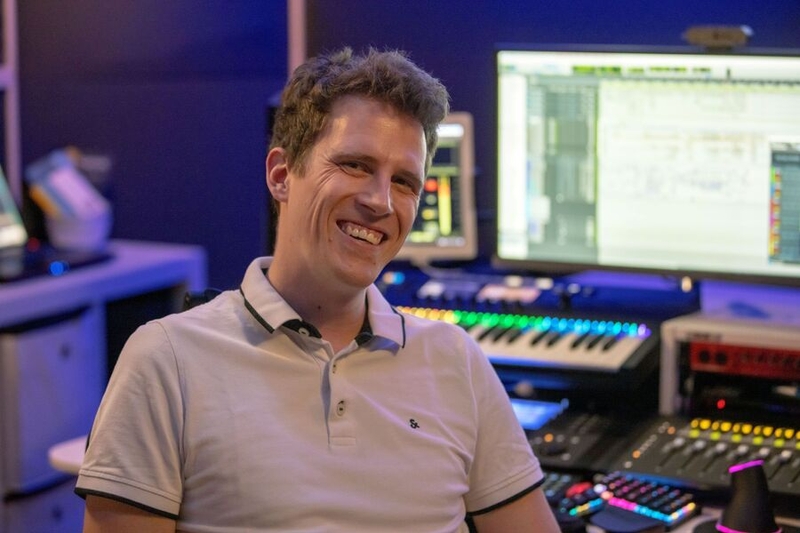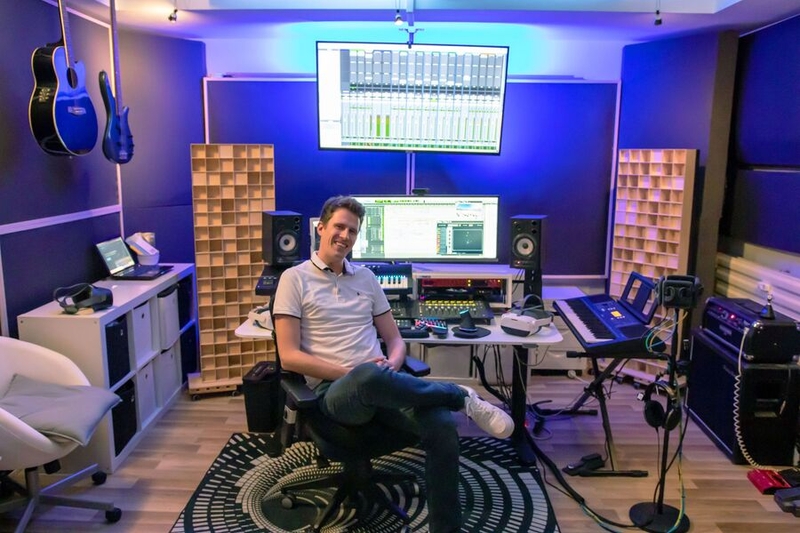The people who use our boards.
361 interviews since 2018
The people who use our boards.
Martin Rieger
Audio EngineerWho are you, and what do you do? What do you like to do outside of work?
Greetings! My name is Martin Rieger, and I’m an audio engineer from Germany with a oddly specific expertise in “immersive audio.” You might be familiar with Dolby Atmos, a technology that revolutionized sound in film and music. However, my goal is to take this a step further and explore the exciting world of immersive media, such as augmented reality, virtual reality, and the metaverse. These new mediums are transforming how we experience sound, and I’m thrilled to be at the forefront of this innovation—now with Apple on board and calling it “spatial computing.” I run a dedicated blog to make 3D audio more accessible.
Immersive audio, spatial audio, 3D binaural sound—whatever you want to call it, it’s the unsung hero of the extended reality (XR) industry! While we all obsess over the eye-popping visuals, spatial audio is the key to unlocking a truly immersive XR experience, creating a sense of actual presence that is unmatched by traditional entertainment media. By accurately simulating the way sound naturally moves through space, immersive audio can enhance the realism and immersiveness of XR.
It can even be useful, since it also plays a crucial role in navigation and object interaction, providing vital cues that help us stay grounded in the virtual world. If you’re not already paying attention to the potential of immersive audio, you’re missing out on what could be the most critical aspect of XR’s development!
Imagine turning something you love doing in your free time into your job and not having to worry about leaving your passion behind when you clock in every day. That’s exactly what happened to me when I made my hobby into a job. Thanks to immersive audio technology, I get to work on exciting projects that feel more like fun than work.
Every day, I’m able to create engaging soundscapes that transport listeners to other worlds, enhance storytelling, and fully immerse them in the project. Hanging out on LinkedIn became not an unhealthy addiction, but a useful tool to communicate with like-minded people. I’m thrilled to say that I don’t have any more hobbies because my job is my passion, and I wouldn’t have it any other way.

What hardware do you use?
As a self-proclaimed hardware enthusiast and lover of all things tech, my collection of devices ranges from an outdated yet still mighty Mac 6.1 to a powerful MSI gaming laptop for all of my VR needs. While I often travel and work remotely, I find myself gravitating towards my trusty MacBook Pro and utilizing OneDrive to easily sync my files across all of my devices. As an avid fan of audio, I’ve found that even with larger files, it’s still manageable.
For those interested in head-mounted displays (HMDs), I have an extensive list that I’m happy to share: Samsung Gear Vr, Oculus Go, Oculus Quest 1+2, Pico G2 4k, Pico G2 Enterprise, Pico Neo 3 Pro, Pico Neo 4 Business. And like three headtrackers that can turn every normal pair of headphone into a spatial audio-enabled devices.
I never thought I’d say it, but I switched to an iPhone. After years of being a die-hard Windows PC and Android smartphone user, I never thought I’d betray my trusty devices for the shiny world of Apple. But, after giving it a chance, I have to admit that the Apple infrastructure works pretty damn well when you have everything. The seamless integration between all of my Apple devices is genuinely impressive, and despite my initial reservations, I can’t deny that I’m enjoying the experience.
When it comes to audio, some people prefer the personal experience of headphones while others love to fill a room with sound using a loudspeaker system. Personally, I’m more of a headphones guy, with a collection that includes the Sennheiser HD 650s, Beyerdynamics DT 770s, Bose QC 35s, and yes, even the AirPods Pro.
However, for those who love to share their music with friends or family, a good loudspeaker system is a must-have. My Adam loudspeaker 2.1 system with SoundID room EQ is a great option for those looking for quality sound and powerful bass.
Welcome to the world of 360°/VR productions, where I’ve been traveling the world to record spatial audio! Here, owning a top-of-the-line array of equipment is essential to bringing your vision to life. Zaxcom radio links, recorders, and high-quality microphones are just the beginning of the toolkit required for VR projects.

And what software?
As an audio professional, I know the importance of using industry-standard software to make sure my work is up to par. That’s why I’ve been relying on Avid Pro Tools for all my audio needs. I have to admit, my feelings towards it are a bit love-hate. On one hand, it’s lightning-fast and offers endless possibilities when it comes to editing.
But on the other hand, it sometimes falls short when it comes to the demands of plug-ins for immersive media. As a result, I’m constantly trying to navigate workarounds and find solutions to these extra demands. Nonetheless, I stand by the fact that Avid ProTools is a reliable audio software that is a staple in the industry. So shout-out to REAPER regardless, this is how I started.
When it comes to mixing, having the right tools at your disposal can make all the difference. As a sound designer working in spatial audio applications, I’ve found that Native Instruments and iZotope offer an impressive array of plug-ins that help me achieve the results I’m looking for. Whether I’m focusing on sound restoration or post-production, these plug-ins provide a versatile palette that allows me to experiment and explore.
What’s your keyboard setup like? Do you use a custom layout or custom keycaps?
Are you tired of shelling out big bucks for a keyboard with colorful letters, especially when it’s not optimized for your big-bucks software? I know I was, which is why I decided to take matters into my own hands and rebuild my Avid Pro Tools keyboard layout.
But let me tell you, it was no easy feat. I went through countless ergonomic keyboards before stumbling upon the ultimate one: the Moonlander. With its customizable layout and comfortable design, I knew I had found the perfect keyboard to pair with my customized Pro Tools shortcuts.
As technology continues to innovate and improve, so does the hardware used to enhance our everyday work tasks. Take for instance the Eucontrol artist mix and control, along with the Stream Deck—two essential hardware tools for a streamlined work process. By incorporating these two components, batch processing can be accomplished more efficiently and hassle-free. These add-ons are just a glimpse of the endless possibilities that hardware can offer and are a great addition to the Moonlander, as you can see on the images.
I’m here to tell you that work doesn’t have to be a pain in the neck (and back, and shoulders). You can still be productive and comfortable! I used to dread sitting down at my desk every day, but then I realized it wasn’t the work that was the problem. I’m really enthusiastic and motivated as you can tell, but the trigger of this thought was the constant sitting.
So I decided to invest in an ergonomic setup. My table is now adjustable so I can stand up whenever I need to stretch my legs, and my mouse is designed to fit my hand comfortably. Let me tell you, it has made a world of difference! I feel more energized and less stiff at the end of the day. So if you’re feeling the strain of work taking a toll on your body, consider going ergonomic.
What would be your dream setup?
Imagine a world where your work setup knows no bounds, where screens have limitless possibilities and your creativity knows no limits. Picture a setup that connects with your voice commands, typing, and effortlessly integrates your work tasks seamlessly.
This is what Apple promises with its new vision for the future of computing, Apple Vision Pro. No more limitations, no more distractions, just pure innovation designed to elevate your work experience. With Apple Vision Pro, you can truly work smarter, not harder; and unlock the full potential of your creativity. It’s a dream setup that’s finally becoming a reality.
As a content creator, having a dream setup may seem like the ultimate goal. But for me, I’ve come to realize that sometimes the best setup is one that already feels complete. I’ve put in the time and effort to create a studio that not only looks great but functions well too.
Sure, there may be newer, fancier equipment out there, but nothing beats the feeling of already having everything you need. Plus, the positive feedback I receive on my setup gives me the confidence to know that I’m doing something right. So, although the idea of a dream setup is tempting, it’s often the little things that make the biggest difference.





